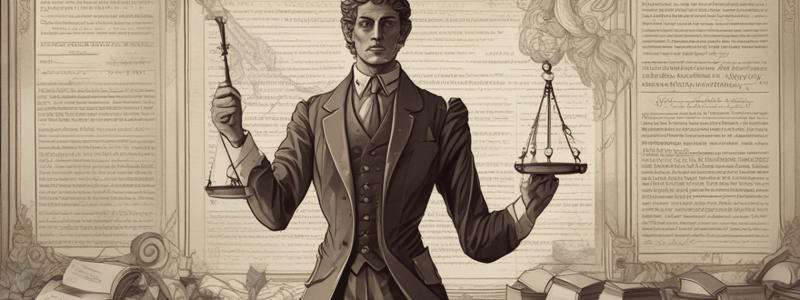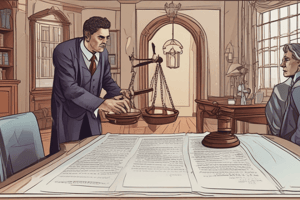Podcast
Questions and Answers
A false statement of past or present fact made by one party to another before or at the time of the contract is a definition of duress.
A false statement of past or present fact made by one party to another before or at the time of the contract is a definition of duress.
False (B)
A false statement of fact(s) must be made in writing to be considered misrepresentation.
A false statement of fact(s) must be made in writing to be considered misrepresentation.
False (B)
Designed concealment is a type of misrepresentation where the person is under a duty to disclose information.
Designed concealment is a type of misrepresentation where the person is under a duty to disclose information.
True (A)
Active concealment is the same as non-disclosure.
Active concealment is the same as non-disclosure.
In the case of Dibley v Furter 1951, the court held that F was not liable to D for non-disclosure of the graveyard.
In the case of Dibley v Furter 1951, the court held that F was not liable to D for non-disclosure of the graveyard.
A misrepresentation must be made with the intention of persuading the other party to conclude the contract.
A misrepresentation must be made with the intention of persuading the other party to conclude the contract.
Disclosure is obligatory in all circumstances.
Disclosure is obligatory in all circumstances.
A warranty or contractual term is considered a misrepresentation.
A warranty or contractual term is considered a misrepresentation.
An opinion or statement about the future can be considered a misrepresentation.
An opinion or statement about the future can be considered a misrepresentation.
Non-disclosure of a fact is always actionable.
Non-disclosure of a fact is always actionable.
A person who has relied on a misrepresentation can cancel the contract or sue for reduction of purchase price.
A person who has relied on a misrepresentation can cancel the contract or sue for reduction of purchase price.
There is a general duty on a party negotiating a contract to reveal information known to them that may influence the mind of the other party.
There is a general duty on a party negotiating a contract to reveal information known to them that may influence the mind of the other party.
A party is always considered responsible for the other party's ignorance if they do not disclose information.
A party is always considered responsible for the other party's ignorance if they do not disclose information.
A contract requires parties to work together in a relationship of trust and confidence, and therefore, omission of information is actionable.
A contract requires parties to work together in a relationship of trust and confidence, and therefore, omission of information is actionable.
A misrepresentation must be made by a party to the contract or their agent to be considered actionable.
A misrepresentation must be made by a party to the contract or their agent to be considered actionable.
In the case of non-disclosure, a reasonable person would not have been persuaded against entering into a contract if disclosure had been made.
In the case of non-disclosure, a reasonable person would not have been persuaded against entering into a contract if disclosure had been made.
A party has a duty to inform by operation of a rule of law, such as in an insurance policy.
A party has a duty to inform by operation of a rule of law, such as in an insurance policy.
The onus is on the influential party to prove undue influence occurred.
The onus is on the influential party to prove undue influence occurred.
Restitutio in integrum is a remedy available to the guilty party.
Restitutio in integrum is a remedy available to the guilty party.
If the innocent party elects to rescind the contract, it terminates immediately.
If the innocent party elects to rescind the contract, it terminates immediately.
The innocent party has the right to set aside the legal consequences of the contract.
The innocent party has the right to set aside the legal consequences of the contract.
The innocent party is not bound by the contract's terms if they choose to uphold it.
The innocent party is not bound by the contract's terms if they choose to uphold it.
Both parties have a duty to restore and/or return any performance made under the contract.
Both parties have a duty to restore and/or return any performance made under the contract.
Intentional misrepresentation renders a contract voidable.
Intentional misrepresentation renders a contract voidable.
Negligent misrepresentation can lead to the enforcement of the contract.
Negligent misrepresentation can lead to the enforcement of the contract.
Innocent misrepresentation allows for a damages claim.
Innocent misrepresentation allows for a damages claim.
Misrepresentation can only be made verbally.
Misrepresentation can only be made verbally.
Active concealment is a type of non-disclosure.
Active concealment is a type of non-disclosure.
Misrepresentation must be made in good faith.
Misrepresentation must be made in good faith.
Flashcards are hidden until you start studying




